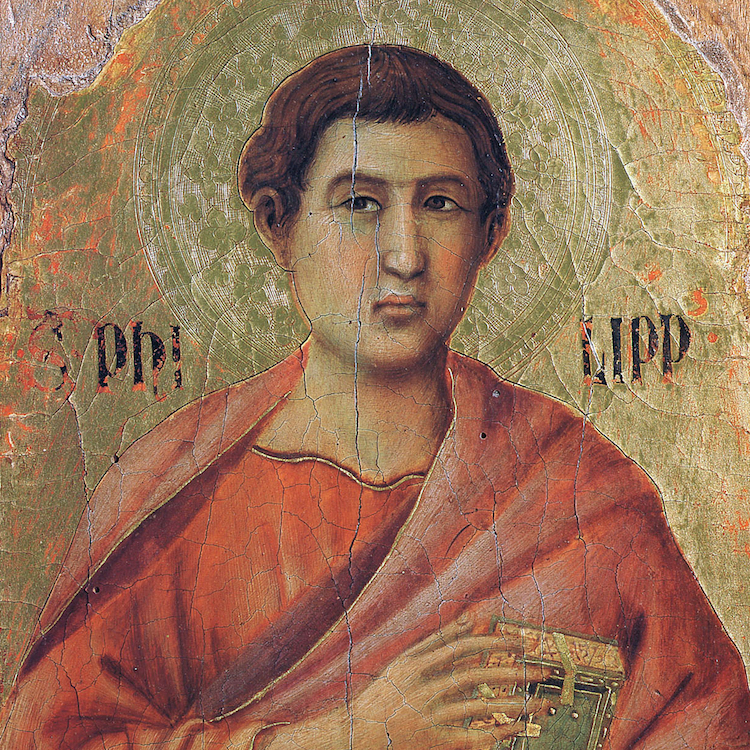Have you ever made a simple comment to someone and gotten an unexpected response in return?
There are those times in life when, after making a statement to someone, the reaction that we get is greatly out of proportion to our comment or question. And sometimes, this can be greatly disturbing and unsettling to both the speaker and the one spoken to.
Today’s Gospel (John 12:20-33) is something like that. The Gospel says that some Greeks, who came to worship at the Passover, approached Philip and asked to see Jesus.
The word “Greek” here means the same as it does in the writings of St. Paul. It refers to any Gentile; those people who are not descendants of Abraham. But these Gentiles had obviously become converts to Judaism; because they came to worship at the Passover. They came to Philip because he too was a Greek convert to Judaism.
The name Philip is a Greek name. It means horse-lover. Philip goes over and tells Andrew, who is another Greek convert. Andrew is also a Greek name that means manly. It’s only logical that the Greek visitors would approach Jesus through the mediation of these two Greek disciples.
But notice what happens when Philip and Andrew go to Jesus and say, “There are some Greeks here who would like to see you”. They obviously hit a hot button, because Jesus virtually explodes. His reaction isn’t the response you would expect to their simple announcement.
Jesus says, “The hour has come for the Son of Man to be glorified.”
Then Jesus adds two more words before He continues speaking. He says, “Amen, Amen!” The word “Amen”, spoken twice like this, is equivalent to a captain blowing a whistle, getting everyone’s attention, and saying, “Now hear this! Now hear this”. In other words, He is saying, “I’m about to tell you something very important; so listen-up!”
Jesus said, “Amen, Amen, I say to you! Unless a grain of wheat falls to the ground and dies, it remains just a grain of wheat. But if it dies, it produces much fruit.”
Jesus is talking here about nothing less than the climax of His existence here on earth. And what is it that triggered this response? Some Greeks had just asked to see Him! But what does this response by Jesus have to do with the Greeks?
In order to understand the answer to that question, we need to look back at today’s first reading.
Jeremiah (31:31-34) writes, “The days are coming says the Lord, when I will make a New Covenant with the House of Israel and the House of Judah.” (Or in other words the New Covenant will be made with all of God’s people) “All from the least to the greatest shall know Me, says the Lord.”
This is a very important verse of Scripture. And, by the way, the term “New Covenant” appears many times in the New Testament. But this is the only time in the Old Testament that the term “New Covenant” appears.
Jesus was obviously aware of the fact that not only was He the promised Messiah and Savior of the Jews. But He also knew that when all the other nations on earth began to come to him, then His mission on earth would be drawing rapidly to its completion.
These Greeks asking to see Jesus represent the fact that other nations are now beginning to come to Him. The whole world must come to Jesus. The eternal plan of His Father is now coming to a head. The hour is at hand. His saving death is imminent. And Jesus says, “Yet what should I say, Father save Me from this hour? But it was for this purpose that I came to this hour.”
Obedient to His Father’s will, Jesus goes right on. Obedient unto His death! And with His death, the New Covenant is established. The New Covenant was put into effect at the very moment of Christ’s death. Just as a “Last Will and Testament” is put into effect at the moment of the death of the one who made the will.
But what is this “New Covenant”? A Covenant is a contractual agreement between two people. And in the Old Testament, the first such Covenant was made between God and Abraham. It was at that time that God said that the land of Canaan was to belong to Abraham and all his descendants forever, if Abraham would simply trust and follow God.
The most famous Old Testament Covenant was made between God and the Israelites through Moses. The condition of this Old Testament Covenant was “The Law”. If the Israelites would be faithful to this Covenant and faithfully keep The Law, then God would be their God and they would be His people.
The definition of the New Covenant is given to us in today’s first reading. God says through the prophet Jeremiah, “This is the New Covenant that I will make with the house of Israel, says the Lord. I will place My law within them and write it upon their hearts. I will be their God and they shall be My people.”
The Old Covenant gave us a glorious standard that was very difficult to follow. Mankind had to leave God in the Temple and follow His Laws, with little or no help from God.
But the New Covenant is written upon our hearts. And it requires nothing from us because everything is from God.
By our faith in the life, death and resurrection of Jesus, we now know that all of our past, present and future sins may be forgiven. These earthly bodies of ours are now the actual Temple of God, because we literally house or possess the Spirit of the living God, the Holy Spirit. We are now a new creation, with a new heart that loves like Jesus loves.
God has actually made it possible for each one of us to be righteous, as the Law of the Old Covenant required, because all of the requirements of The Law have been fulfilled by Jesus, not by you or me. This gift of salvation is freely offered to all, and is received through faith. Thus, in the New Covenant, God has done everything. All we bring is our faith. Yes we still possess our free will, and as such we are free to make our own choices. But as a new creation, in this New Covenant, we give up our pride, our plans, our will, and our manipulations; we strip ourselves of our ability to trust in ourselves. We die to ourselves, so that the world may see that our trust lies totally in God alone.
It is obvious that what Jesus said about a grain of wheat falling to the ground and dying, applies not only to Jesus, but also to you and me; because immediately after making that statement, Jesus said, “Whoever loves his life loses it, and whoever hates his life in this world will preserve it for eternal life.”
Jesus is calling us to a new way of life, to a process of conversion. Jesus taught us that the value of life is not measured by the number of breaths we take, but rather our values in life should define our reasons for breathing. Life is measured by loving relationships, by our service to others and by our worship and praise to God.
These Gentiles in today’s Gospel represent all people. They represent you, and they represent me. Sinners though we are, we became members of this New Covenant by our baptism.
We are only one week away from Palm Sunday, or Passion Sunday, and the holiest week in the Church year.
Traditionally we prepare ourselves to celebrate these Sacred Mysteries by participating in the Sacrament of Reconciliation. It is one of the things that we Catholics do. We seek forgiveness for the times that we have failed. And as we do, we remember the words of Jeremiah in today’s first reading, “I will forgive their evil doings, and remember their sins no more.”
This phrase, “remember no more”, reminds me of the story of Saint Mary Margaret Alacoque, who lived in France between the years 1647 to 1690. She experienced many visions of Jesus, and in these visions she was asked to spread devotion to His Sacred Heart.
A priest, who wanted to confirm the validity of the visions Saint Mary Margaret claimed to be having, told her that the next time she saw Jesus, to ask Him this question. “What was the last sin I told in Confession?” She did see Jesus again, and she did ask him that question. And Jesus gave her this answer, “Tell him – I don’t remember any of his sins.”
That’s exactly what God said through the prophet Jeremiah, “I will remember their sins no more.”
So thanks to the New Covenant given to us by Jesus, we not only carry His Spirit and His will within us, written on our hearts; we now also have the opportunity of having our failures forgiven and forgotten.
Jesus said, “I will draw everyone to myself.” So our presence here today is no accident. We have all been drawn here today, to Jesus, to remember, to celebrate, to serve and to follow Him. May each and every one of us be ever conscious of His Spirit within, and may we bear witness to Him, and thereby bear much fruit for Him.








